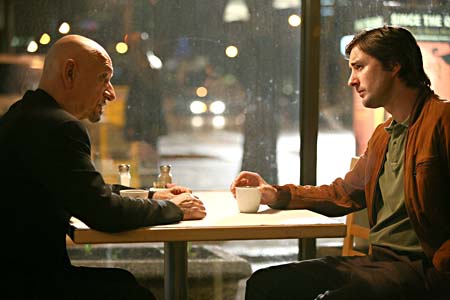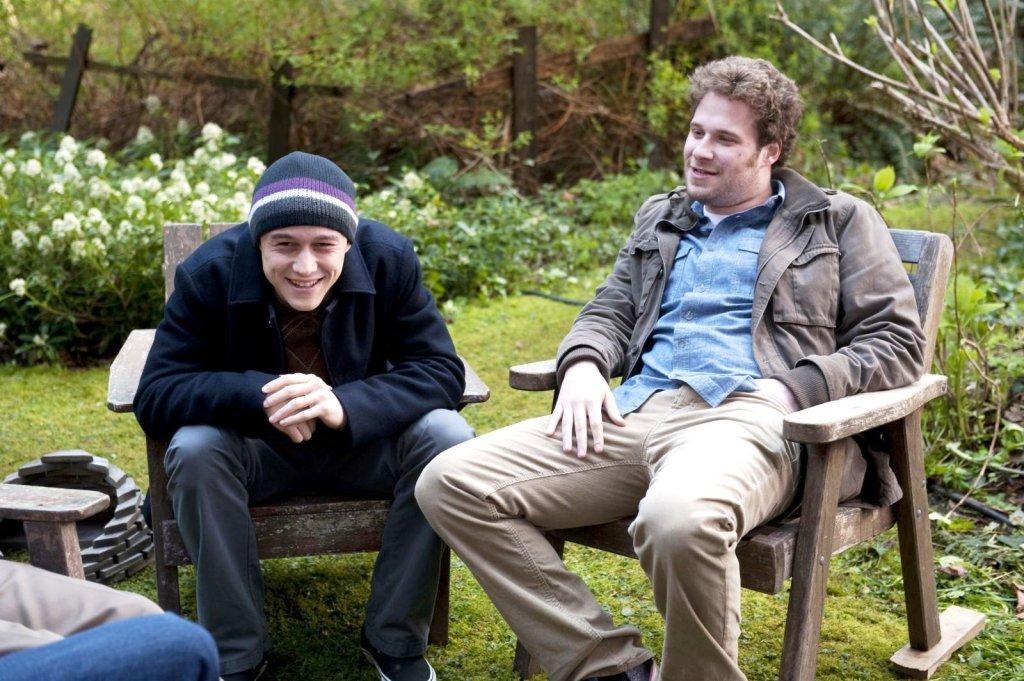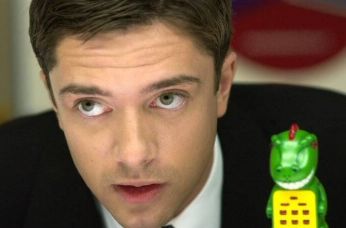 Well, in its favor, John Dahl’s You Kill Me, which I caught Friday night down at the Angelika, has its heart in the wrong place. This tale of an alcoholic hitman trying to find the wagon works really hard to be a wicked and misanthropic black comedy akin to other, better noirs in Dahl’s oeuvre, such as The Last Seduction and Red Rock West. But, while I found myself intermittently amused by the film, the strain shows. In sum, You Kill Me is too self-consciously quirky by half, the jokes are mostly all-setup and little-payoff, and unfortunately Dahl is mining material here that’s already been done better elsewhere, from Sopranos to Fight Club to Six Feet Under to Miller’s Crossing. The result, while not a terrible night at the movies by any means, is probably at best a rental. Or, since it’s an IFC Films production, wait for its no-doubt continual rotation on the IFC Channel…in short, it won’t kill you to hang back on this one.
Well, in its favor, John Dahl’s You Kill Me, which I caught Friday night down at the Angelika, has its heart in the wrong place. This tale of an alcoholic hitman trying to find the wagon works really hard to be a wicked and misanthropic black comedy akin to other, better noirs in Dahl’s oeuvre, such as The Last Seduction and Red Rock West. But, while I found myself intermittently amused by the film, the strain shows. In sum, You Kill Me is too self-consciously quirky by half, the jokes are mostly all-setup and little-payoff, and unfortunately Dahl is mining material here that’s already been done better elsewhere, from Sopranos to Fight Club to Six Feet Under to Miller’s Crossing. The result, while not a terrible night at the movies by any means, is probably at best a rental. Or, since it’s an IFC Films production, wait for its no-doubt continual rotation on the IFC Channel…in short, it won’t kill you to hang back on this one.
 When we first encounter Polish-American assassin Frank Falencyzk (Ben Kingsley with an inscrutable accent), it’s a snowy winter morning in dreary Buffalo, and Frank is interrupting his daily downing of Smirnoff with occasional, half-hearted stabs at shoveling his steps. But, as we soon discover, half-hearted stabs pretty much sums up Frank’s life these days: his passionate love affair with the bottle has encroached considerably on his predatory livelihood, as evidenced by his sleeping through a crucial hit on local Irish mob boss Edward O’Leary (Dennis Farina). So, after an angry intervention by his gangland employer (Phillip Baker-Hall) and best friend (Marcus Thomas), Frank is shipped off to San Francisco with orders to clean up his act, namely by getting himself into AA and holding down a new job as an undertaker’s assistant. This Frank attempts to do, mainly because he’s being watched by a gun-toting local wiseguy (Bill Pullman) with a passion for the real estate market. But soon Frank has found a new sponsor (Luke Wilson) and a new potential ladyfriend (Tea Leoni), and starts seriously thinking about a life after vodka. Of course, just at this moment, his flailing friends in the Buffalo mafia find they need him back in the worst way…
When we first encounter Polish-American assassin Frank Falencyzk (Ben Kingsley with an inscrutable accent), it’s a snowy winter morning in dreary Buffalo, and Frank is interrupting his daily downing of Smirnoff with occasional, half-hearted stabs at shoveling his steps. But, as we soon discover, half-hearted stabs pretty much sums up Frank’s life these days: his passionate love affair with the bottle has encroached considerably on his predatory livelihood, as evidenced by his sleeping through a crucial hit on local Irish mob boss Edward O’Leary (Dennis Farina). So, after an angry intervention by his gangland employer (Phillip Baker-Hall) and best friend (Marcus Thomas), Frank is shipped off to San Francisco with orders to clean up his act, namely by getting himself into AA and holding down a new job as an undertaker’s assistant. This Frank attempts to do, mainly because he’s being watched by a gun-toting local wiseguy (Bill Pullman) with a passion for the real estate market. But soon Frank has found a new sponsor (Luke Wilson) and a new potential ladyfriend (Tea Leoni), and starts seriously thinking about a life after vodka. Of course, just at this moment, his flailing friends in the Buffalo mafia find they need him back in the worst way…
 There’s grist for some pretty dark, funny goings-on in this set-up, and one of the better running jokes is that Frank’s trying to throw off the demon rum — and his friends are helping him — mainly just so he can kill people more efficiently. But, while You Kill Me aims to aim low, it’s already been beaten to the punch by a lot of other solid and memorable films and TV shows. Even notwithstanding Frank’s Tony Soprano-ish vulnerabilities, his adventures in AA were already mostly anticipated by the bleak humor of the first act of Fight Club, and his backroom shenanigans in the mortuary business can’t help but recall similar moments in Six Feet Under. (The Polish v. Irish clan war in Buffalo, meanwhile, mostly recalls Tom Reagan’s negotiating the Irish-Italian divide in Miller’s Crossing.) Some sort of overlap is to be expected, of course — the mob movie isn’t exactly what you’d call a virgin genre at this point — but in each case here, unfortunately, Dahl’s film comes up on the short side.
There’s grist for some pretty dark, funny goings-on in this set-up, and one of the better running jokes is that Frank’s trying to throw off the demon rum — and his friends are helping him — mainly just so he can kill people more efficiently. But, while You Kill Me aims to aim low, it’s already been beaten to the punch by a lot of other solid and memorable films and TV shows. Even notwithstanding Frank’s Tony Soprano-ish vulnerabilities, his adventures in AA were already mostly anticipated by the bleak humor of the first act of Fight Club, and his backroom shenanigans in the mortuary business can’t help but recall similar moments in Six Feet Under. (The Polish v. Irish clan war in Buffalo, meanwhile, mostly recalls Tom Reagan’s negotiating the Irish-Italian divide in Miller’s Crossing.) Some sort of overlap is to be expected, of course — the mob movie isn’t exactly what you’d call a virgin genre at this point — but in each case here, unfortunately, Dahl’s film comes up on the short side.
 What’s more, too many of the jokes in You Kill Me are telegraphed long before they reach fruition (c.f. the disgruntled guy at the toll booth), and too many of the plot devices just defy credulity: Tea Leoni’s character, for example, is given a problem with “boundary issues,” mainly because the romance here wouldn’t hang together any other way. Similarly, most of the reveals conveniently take place in the midst of AA meetings in ways that feel entirely too Hollywood to be taken seriously. All this being said, I never quite turned on You Kill Me like I probably should have — Despite its many faults, I did spend most of the film with a smile on my face (This may partly be because Bill Pullman is kicking around back there. He’s pretty over-the-top here — and hard to call a good actor in any case — but he is one of those hard-working character guys I enjoy seeing around. And, if nothing else, he pushes back against the Wilson factor…although, to his credit, Luke here is much less intrusive than his brother Owen tends to be of late.)
What’s more, too many of the jokes in You Kill Me are telegraphed long before they reach fruition (c.f. the disgruntled guy at the toll booth), and too many of the plot devices just defy credulity: Tea Leoni’s character, for example, is given a problem with “boundary issues,” mainly because the romance here wouldn’t hang together any other way. Similarly, most of the reveals conveniently take place in the midst of AA meetings in ways that feel entirely too Hollywood to be taken seriously. All this being said, I never quite turned on You Kill Me like I probably should have — Despite its many faults, I did spend most of the film with a smile on my face (This may partly be because Bill Pullman is kicking around back there. He’s pretty over-the-top here — and hard to call a good actor in any case — but he is one of those hard-working character guys I enjoy seeing around. And, if nothing else, he pushes back against the Wilson factor…although, to his credit, Luke here is much less intrusive than his brother Owen tends to be of late.)







